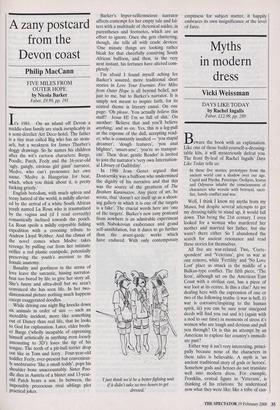A zany postcard from the Devon coast
Philip MacCann
FIVE MILES FROM OUTER HOPE by Nicola Barker Faber, £9.99, pp. 191 It's 1981. On an island off Devon a middle-class family are stuck inexplicably in a semi-derelict Art Deco hotel. The father is a tiny man called Big who has no stom- ach, but a weakness for James Thurber's doggy drawings. So he names his children after the wit's cartoon characters: Barge, Poodle, Patch, Feely and the 16-year-old `ugly, gangly, envious girl giant' narrator, Medve, who can't pronounce her own name. `Medve is Hungarian for bear, which, when you think about it, is pretty fucking grizzly.' English boredom, with much spleen and teeny hatred of the world, is mildly alleviat- ed by the arrival of a white South African youth named La Roux who is traumatised by the vagina and (if I read correctly) romantically inclined towards the pooch. La Roux spoils a mildly enjoyable fishing expedition with a crooning tribute to Andrew Lloyd Webber. And the climax of the novel comes when Medve takes revenge by pulling out from her intimate orifice a red plastic centipede, potentially preserving the youth's aversion to the female anatomy. Banality and goofiness in the arena of love leave the sarcastic, hissing narrator- brat too bored by life to give her story all. She's funny and ultra-droll but we aren't convinced she has seen life. In her two- dimensional picture nothing much happens except exaggerated doodles. While driving one night Big knocks down six animals in order of size — such an incredible incident, more like something out of Disney than real life, that he looks to God for explanation. Later, elder broth- er Barge (`wholly incapable of expressing, himself artistically in anything even loosely amounting to 3D') loses the tip of his tongue. The teeth of a pit-bull terrier drop out like in Tom and Jerry. Four-year-old toddler Feely, ever-present but convenient- ly unobtrusive 'like a small teddy', pops his shoulder bone unaccountably. Sister Poo- dle dies in Austria of a blister and 13-year- old Patch bears a son. In between, the impossibly precocious rival siblings plot practical jokes. Barker's hyper-selfconscious narrator affects contempt for her empty tale and fal- ters with a multitude of rhetorical asides, in parentheses and footnotes, which are an effort to ignore. Once she gets chattering, though, she tells all with crude devices: `One minute things are looking rather bleak for that cheerfully conniving South African buffoon, and then, in the very next instant, his fortunes have altered com- pletely.'
I'm afraid I found myself aching for Barker's assured, more traditional short stories in Love Your Enemies. Five Miles from Outer Hope is all beyond belief, not just to me, but to Barker's narrator. It is simply not meant to inspire faith, for its central theme is literary ennui. On one page: 'Oh please. You actually believe this stuff? Jesus HI I'm so full of shit.' On another: 'Believe that and you'll believe anything,' and so on. Yes, this is a leg-pull at the expense of the dull, accepting read- er, who is constantly insulted — 'you stupid dreamer', 'dough features', 'you anal blighter', 'smart-arse', 'you're so transpar- ent'. Then 'dear, gentle Reader' is invited to join the narrator's 'very own Internation- al Library of Gullibility'. In 1986 Jean Genet argued that Dostoevsky was a buffoon who undermined the dignity of his narrative and that this was the source of the greatness of The Brothers Karamazov. Any piece of art, he wrote, that 'doesn't set itself up as a shoot- ing gallery in which it is one of the targets is a fake'. The crucial words here are 'one of the targets'. Barker's new zany postcard from nowhere is an admirable experiment with Nabokovian exuberance and grand self-annihilation, but it dares to go further than the avant-garde works which have endured. With only contemporary `I just think we'd be a better fighting unit if it didn't take us two hours to get dressed.' emptiness for subject matter, it happily embraces its own insignificance at the level of farce.


































































 Previous page
Previous page